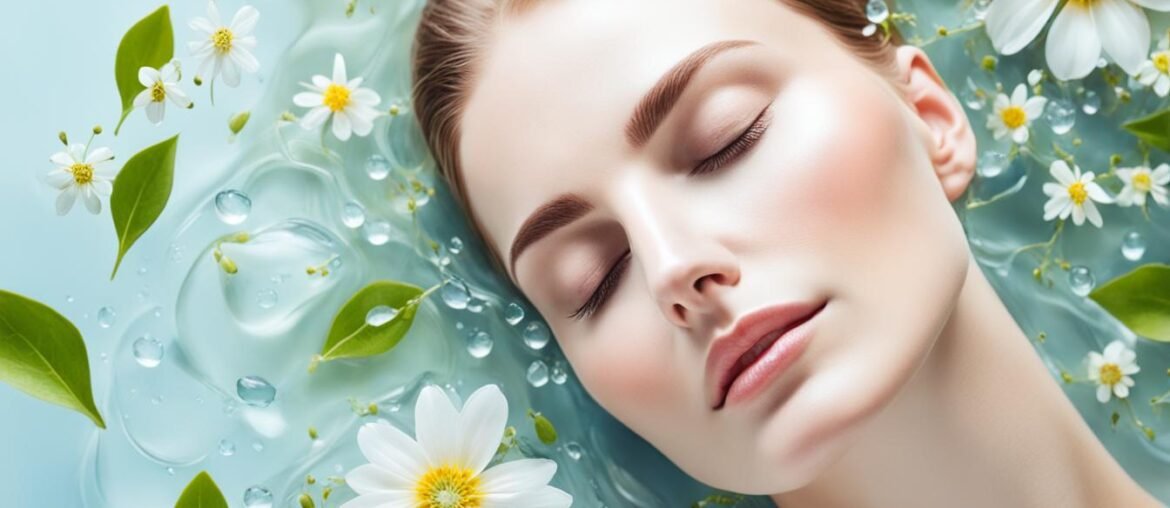Did you know that a lack of sleep can leave your skin dehydrated and dull? Research has shown that sleep plays a crucial role in maintaining optimal skin hydration and overall skin health. It’s not just about beauty sleep; it’s about giving your skin the moisture it needs to look and feel its best.
Sleep deprivation can lead to a decrease in skin hydration levels, resulting in dry, flaky skin. In addition, lack of sleep can affect the skin’s elasticity, leading to the formation of fine lines and wrinkles. But it’s not all bad news. By prioritizing sleep and ensuring you get enough rest, you can support your skin’s natural hydration and promote a healthier complexion.
Key Takeaways:
- A good night’s sleep is essential for maintaining optimal skin hydration.
- Sleep deprivation can lead to dry, flaky skin and decreased elasticity.
- Prioritizing sleep helps promote a healthier complexion and prevent premature aging.
- Getting enough rest supports your skin’s natural hydration balance.
- By taking care of your sleep, you can enhance the health and appearance of your skin.
Importance of Sleep for Skin Health
Adequate sleep is essential for maintaining skin health and hydration levels. When we don’t get enough sleep, our skin can become dry and dehydrated, leading to a lackluster complexion and the appearance of dark circles under the eyes. Research has shown that sleep deprivation can decrease skin hydration levels and negatively impact the skin’s elasticity. On the other hand, getting enough sleep plays a crucial role in maintaining the skin’s moisture balance, resulting in a healthier and more radiant complexion.
Sleep not only contributes to skin hydration, but it also plays a vital role in overall skin health. During sleep, the body undergoes various restorative processes, including the repair and regeneration of skin cells. Lack of sleep can disrupt these processes, leading to impaired skin function and a slower rate of skin cell renewal. On the contrary, adequate sleep allows the skin to effectively repair itself, resulting in healthier-looking skin with improved texture and appearance.
The Impact of Sleep on Skin
When we sleep, our body’s hydration levels are regulated, ensuring the skin stays moisturized. During sleep, the body produces less cortisol, a stress hormone that can contribute to skin dryness. Additionally, the skin’s barrier function is strengthened during sleep, helping to prevent moisture loss and environmental damage.
“Sleep is essential for maintaining a healthy skin barrier function. It allows our skin to better retain moisture, preventing dryness and promoting a youthful and glowing complexion,” says Dr. Emily Lee, a dermatologist at XYZ Dermatology.
The Role of Sleep in Skin Repair and Regeneration
Sleep is also crucial for skin repair and regeneration. During sleep, the body produces collagen and growth hormones, which are essential for maintaining skin elasticity and firmness. Lack of sleep can disrupt these processes, leading to decreased collagen production and slower skin cell turnover. Conversely, adequate sleep allows the skin to repair damage caused by environmental factors and daily stressors, resulting in a healthier and more youthful appearance.
“Sleep is the body’s time for self-repair, and the skin benefits greatly from this restorative period. It’s during sleep that the skin cells regenerate and repair themselves, leading to a more rejuvenated complexion,” explains Dr. Sarah Johnson, a board-certified dermatologist at ABC Dermatology.
How to Improve Sleep for Better Skin Health
To optimize sleep for better skin health, it is important to prioritize sleep hygiene and establish a consistent sleep routine. Here are some tips:
- Avoid caffeine and stimulating activities before bedtime.
- Create a calming bedtime routine to signal your body that it’s time to sleep.
- Ensure a comfortable sleep environment with a supportive mattress and pillows.
- Use silk or satin pillowcases to minimize friction and reduce the risk of skin irritations.
- Avoid screens and bright lights before sleep, as they can disrupt the body’s natural sleep-wake cycle.
By prioritizing sleep and implementing these tips, you can support your skin’s hydration, repair, and overall health. Remember, a good night’s sleep is essential for achieving a glowing and youthful complexion.
Impact of Sleep on Skin’s Water Content
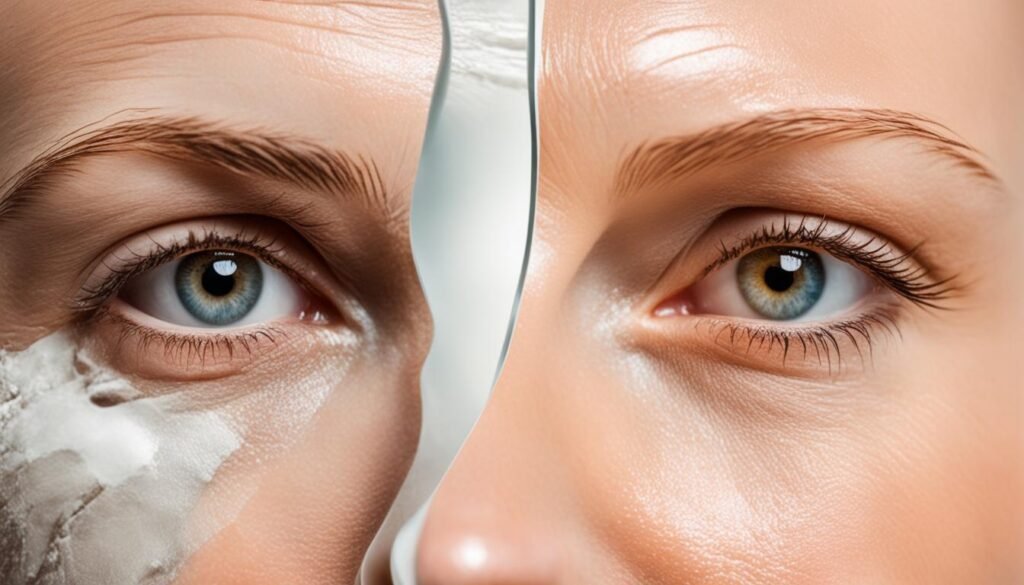
Sleep plays a significant role in maintaining the water content of our skin. When we don’t get enough sleep, it can lead to dehydration, resulting in dry, flaky, and lackluster skin. Research has shown that individuals who experience sleep deprivation tend to have lower skin hydration levels compared to those who get adequate rest. This suggests a relationship between sleep and skin hydration.
Adequate sleep helps to keep the skin balanced, healthy, and properly hydrated. It allows the skin to retain moisture, preventing dehydration and maintaining its natural glow. By prioritizing sleep, we can support the skin’s moisture balance and overall health.
Here is a table that highlights the impact of sleep on skin’s water content:
| Sleep Duration | Skin Hydration Levels |
|---|---|
| Less than 6 hours | Low |
| 6-8 hours | Moderate |
| 8+ hours | Optimal |
As the table demonstrates, the duration of sleep directly affects skin hydration levels. Getting less than six hours of sleep can lead to lower skin hydration, while getting an optimal eight or more hours of sleep promotes optimal skin hydration.
The Relationship Between Sleep and Skin Hydration
Sleep directly impacts skin hydration by influencing various physiological processes that affect the skin. When we sleep, our body restores and repairs itself, including the skin. During this restorative period, the skin’s moisture balance is maintained, and essential hydration is replenished. Lack of sufficient sleep disrupts this process, leading to decreased skin hydration and moisture loss.
Insufficient sleep can disrupt the natural moisture barrier of the skin, resulting in increased water evaporation and decreased moisture retention.
It is crucial to prioritize sleep to ensure our skin’s water content remains at optimal levels. By getting enough sleep, we promote skin hydration, which contributes to a healthy, supple, and radiant complexion.
Effects of Sleep Deprivation on Skin Appearance
Sleep deprivation can have a significant impact on the appearance of your skin. Lack of sleep can result in dark under-eye circles, dry skin, and a sunken appearance of the cheeks. Research has shown that inadequate sleep can also contribute to a decrease in skin elasticity, leading to the formation of fine lines and wrinkles. Additionally, sleep disruption has been associated with the worsening of skin conditions such as rosacea.
However, it is worth noting that not all studies have found a direct and significant link between sleep deprivation and facial appearance. While these effects are commonly observed, further research is needed to fully understand the precise relationship between sleep and skin appearance.
“Sleep deprivation can result in dark under-eye circles, dry skin, and a sunken appearance of the cheeks.”
| Effects of Sleep Deprivation on Skin Appearance | Research Findings |
|---|---|
| Dark under-eye circles | Directly related to lack of sleep |
| Dry skin | Associated with sleep deprivation |
| Sunken cheeks | Linked to inadequate sleep |
| Decreased skin elasticity | Observed in sleep-deprived individuals |
| Fine lines and wrinkles | Can be a result of insufficient sleep |
| Exacerbation of skin conditions | Sleep disruption may worsen conditions like rosacea |
While sleep deprivation can have these effects on your skin, establishing a healthy sleep routine, practicing good sleep hygiene, and addressing any sleep-related issues can help improve your skin’s appearance and overall health.
Further Research on Sleep and Skin Appearance
While some studies have provided evidence on the effects of sleep deprivation on skin appearance, there is still ongoing research to fully understand the relationship between sleep and the visible signs of aging on the skin. Scientists are working to unravel the mechanisms behind how sleep influences skin health and appearance.
It is evident that sleep plays a vital role in maintaining the overall health of your skin. However, as with many scientific studies, further research is necessary to provide a comprehensive understanding of the effects of sleep on skin appearance.
Tips for Improving Skin During Sleep
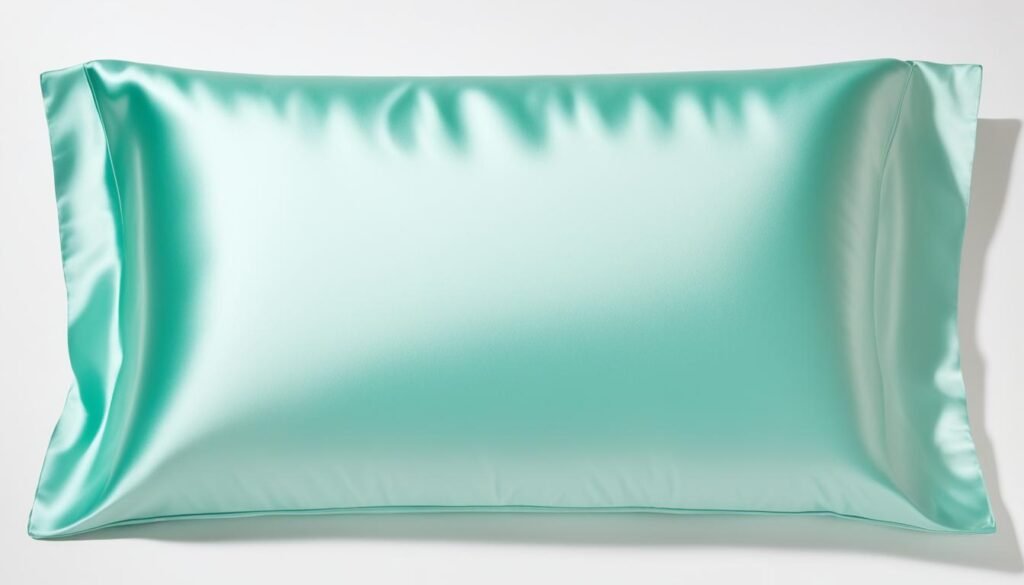
When it comes to enhancing the quality of your skin while you sleep, there are several tips and tricks you can incorporate into your routine. One simple yet effective method is to switch to silk sheets and pillowcases. Not only are they luxurious and soft to the touch, but silk also has numerous benefits for your skin.
Silk is gentle on the skin and reduces friction, preventing potential inflammation and irritation. This is especially beneficial for those with acne-prone or sensitive skin. By minimizing friction, silk can help prevent worsened skin conditions and promote a healthy complexion.
In addition to reducing friction, silk fabric absorbs less moisture and dirt compared to other materials, keeping your skin cleaner and preventing breakouts. This is particularly advantageous for individuals with oily or acne-prone skin, as the reduced absorption can support clearer skin.
Moreover, sleeping on silk bed linens can enhance not only the quality of your skin but also the overall duration and quality of your sleep. Silk is known to regulate body temperature and promote airflow, creating a more comfortable sleep environment, especially during hot summer nights.
It’s important to note that while silk can provide numerous benefits for your skin, it’s always essential to combine it with a healthy skincare routine and good sleep hygiene practices. Here is a summary of tips to improve your skin during sleep:
- Switch to silk sheets and pillowcases to reduce friction and prevent skin irritation.
- Enjoy the cleanliness benefits of silk by using it to absorb less moisture and dirt.
- Experience the enhanced comfort of silk bed linens, promoting better sleep quality and duration.
By incorporating these tips into your bedtime routine, you can optimize your skin’s health and wake up with a refreshed and radiant complexion.
| Tips for Better Skin During Sleep | Benefits |
|---|---|
| Switch to silk sheets and pillowcases | Reduces friction, prevents inflammation, and supports healthy skin |
| Use silk to absorb less moisture and dirt | Keeps skin cleaner and helps prevent breakouts |
| Opt for silk bed linens | Enhances sleep quality and duration, regulates body temperature |
Example of a Silk Pillowcase
Investing in silk products can be a game-changer for your skin and overall sleep experience.
The Link Between Sleep and Skin Function
Sleep plays a vital role in the function and repair of the skin. During sleep, the body undergoes various restorative processes, including the production of growth hormones and the repair of damaged skin cells. Lack of sleep can disrupt these processes, leading to impaired skin function and a slower rate of skin cell renewal. Adequate sleep allows the skin to effectively repair and renew itself, resulting in healthier and more radiant-looking skin.
| Benefit of Sleep | Impact on Skin Function |
|---|---|
| Production of growth hormones | Stimulates collagen production and skin regeneration |
| Repair of damaged skin cells | Restores skin barrier function and promotes healing |
| Enhanced blood circulation | Delivers nutrients and oxygen to the skin for optimal function |
“Sleep is essential for the proper functioning of our skin. It allows our skin cells to rejuvenate and repair, contributing to a more youthful and healthy appearance.”
Additionally, sleep plays a crucial role in skin cell renewal. As we sleep, the turnover of skin cells increases, allowing for the removal of dead cells and the regeneration of new ones. This process helps to maintain skin elasticity, smoothness, and overall youthfulness.
“Sleep is like a reset button for our skin, allowing it to shed old cells and replace them with fresh, new ones. This renewal process is essential for maintaining a vibrant and glowing complexion.”
It is important to prioritize sufficient sleep to optimize skin function and promote overall skin health. By getting an adequate amount of sleep, we can support the natural repair and renewal processes of the skin, leading to a more vibrant and youthful complexion.
“Make sleep a priority and wake up to healthier, more rejuvenated skin.”
Sleep Quality and Skin Moisture
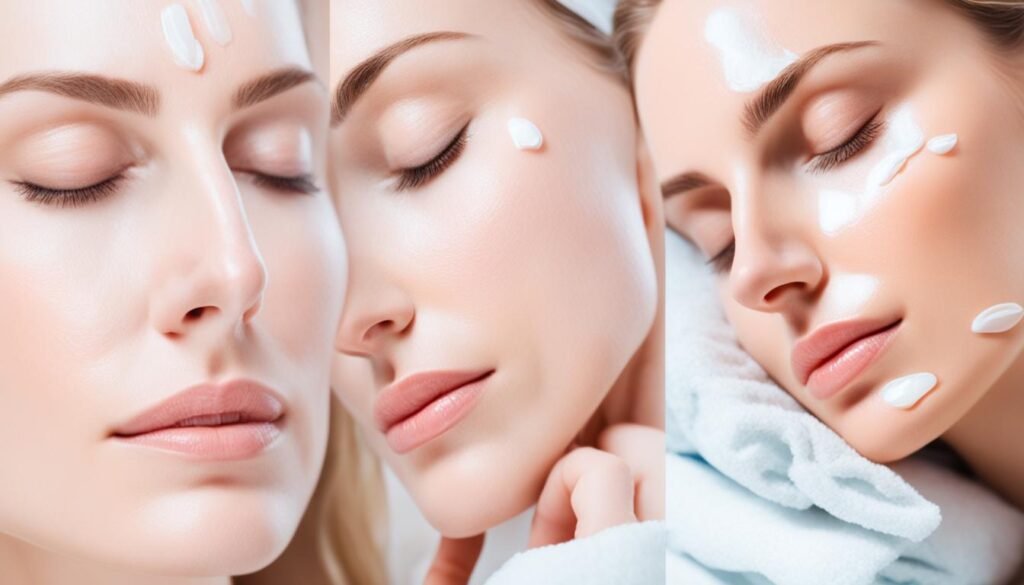
The quality of sleep plays a crucial role in maintaining optimal skin hydration. When the quality of sleep is poor, it can directly impact the moisture levels of the skin, leading to dry and dull-looking skin. Research has shown that individuals who experience sleep disturbances are at an increased risk of skin dehydration and skin barrier dysfunction.
Ensuring a good sleep environment and practicing good sleep hygiene are essential for improving sleep quality and maintaining optimal skin moisture levels. Creating a comfortable and relaxing sleep environment can help promote better sleep and, in turn, enhance skin hydration. This can be achieved by keeping the bedroom cool, dark, and quiet, using comfortable bedding, and avoiding electronic devices before bedtime.
Practicing good sleep hygiene involves adopting habits and routines that promote better sleep. This includes maintaining a consistent sleep schedule, avoiding stimulating activities close to bedtime, and practicing relaxation techniques such as meditation or deep breathing exercises. Addressing any underlying sleep disorders, such as sleep apnea or insomnia, can also significantly improve sleep quality and help maintain optimal skin moisture levels.
By prioritizing sleep and taking steps to improve sleep quality, individuals can effectively enhance skin hydration and promote a healthier and more vibrant complexion.
| Sleep Quality | Impact on Skin Moisture |
|---|---|
| Poor | Decreased skin hydration |
| Good | Optimal skin moisture levels |
Key Takeaways:
- Poor sleep quality can lead to decreased skin hydration and dryness.
- Individuals who experience sleep disturbances are at a higher risk of skin dehydration and skin barrier dysfunction.
- Creating a comfortable sleep environment and practicing good sleep hygiene are crucial for improving sleep quality and maintaining optimal skin moisture levels.
- Addressing sleep disorders and adopting relaxation techniques can significantly enhance sleep quality and promote healthier and more hydrated skin.
Sleep Deprivation and Skin Conditions
Sleep deprivation not only affects our overall well-being but can also have a significant impact on our skin health. Studies have shown a clear relationship between lack of sleep and various skin conditions, exacerbating their severity and contributing to skin problems.
One common skin condition that can be worsened by sleep deprivation is acne. Inadequate sleep disrupts the body’s natural healing and repair processes, leading to increased inflammation in the skin. This inflammation can further clog pores, promote bacterial growth, and result in more frequent breakouts.
Eczema, a chronic skin condition characterized by dry, itchy, and inflamed skin, is also affected by lack of sleep. Sleep disruption can trigger immune system dysregulation and increase inflammation in the body, making eczema symptoms more pronounced and difficult to manage. Adequate sleep can help reduce inflammation and improve the overall condition of eczema-prone skin.
Psoriasis, another chronic inflammatory skin condition, is known to worsen with sleep deprivation. Poor sleep quality can contribute to increased stress levels, triggering psoriasis flare-ups and leading to skin lesions and discomfort. Prioritizing good sleep hygiene and managing stress can play a crucial role in managing psoriasis symptoms and maintaining skin health.
Rosacea, a common skin condition characterized by facial redness and sensitivity, can also be influenced by lack of sleep. Sleep disruption can trigger inflammatory responses in the body, leading to increased redness and worsening of existing rosacea symptoms. Patients with rosacea should strive to establish a regular sleep routine and practice good sleep habits to minimize flare-ups.
“Adequate sleep is essential for maintaining skin health and managing various skin conditions. Lack of sleep can exacerbate inflammation, compromise the body’s immune response, and worsen the severity of skin conditions like acne, eczema, psoriasis, and rosacea.”
Proper sleep hygiene and addressing sleep disturbances are vital for maintaining skin health and managing skin conditions. Establishing a consistent sleep schedule, creating a sleep-friendly environment, and practicing relaxation techniques before bedtime can promote better sleep quality and contribute to healthier skin. Consulting with a healthcare professional or dermatologist can also provide valuable insights and personalized recommendations for managing specific skin conditions.
Impact of Lack of Sleep on Skin Conditions
| Skin Condition | Impact of Sleep Deprivation |
|---|---|
| Acne | Increased inflammation and breakouts |
| Eczema | Worsened symptoms, increased itching and inflammation |
| Psoriasis | Triggered flare-ups, increased skin lesions |
| Rosacea | Heightened redness and sensitivity |
As illustrated in the table above, sleep deprivation can have adverse effects on various skin conditions. By prioritizing good sleep habits and seeking professional advice, individuals can improve sleep quality and better manage their skin conditions.
The Role of Sleep in Skin Aging
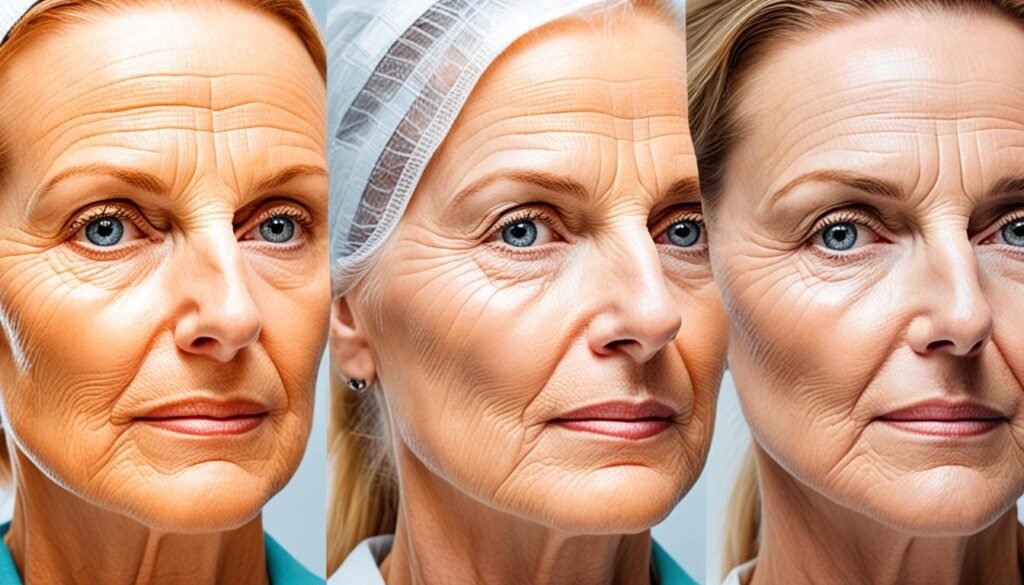
Sleep plays a significant role in the aging process of the skin. Lack of sleep can impact the appearance and health of our skin, leading to the development of wrinkles, fine lines, and a dull complexion. Sleep deprivation has been found to decrease collagen production, a vital protein responsible for maintaining skin elasticity and firmness. When collagen production decreases, the skin loses its ability to bounce back, making it more prone to wrinkles and sagging. Additionally, sleep deprivation impairs the skin’s ability to repair itself, hindering the rejuvenation process and resulting in visible signs of aging.
Chronic sleep deprivation also contributes to increased oxidative stress, which accelerates the aging process and damages the skin. Oxidative stress refers to an imbalance between the production of free radicals and the body’s ability to neutralize them. When this balance is disrupted, free radicals can cause cellular damage, leading to premature aging and the formation of wrinkles.
It is important to prioritize adequate sleep to maintain the skin’s youthful appearance and prevent premature aging. Nurturing a consistent sleep routine and ensuring sufficient sleep duration can help support the skin’s natural repair and regeneration processes. Open your day with a good night’s sleep to wake up with refreshed, rejuvenated skin.
| Effect of Sleep on Skin Aging | Impact |
|---|---|
| Decreased collagen production | Increased appearance of wrinkles and fine lines |
| Impaired skin repair processes | Slower skin cell turnover and rejuvenation |
| Increased oxidative stress | Accelerated aging and skin damage |
Sleep and Overall Well-being
Getting enough sleep is essential for the overall well-being of both our physical and mental health. Adequate sleep plays a crucial role in maintaining optimal bodily functions and promoting a healthy mind. The benefits of good sleep extend far beyond skin health, encompassing various aspects of our well-being.
“Sleep is the foundation of a healthy lifestyle, influencing every part of our being.”
The Physical Benefits of Sleep
Proper sleep has a significant impact on our physical health. It helps regulate our metabolism, promotes a healthy weight, and reduces the risk of developing chronic conditions. Studies have shown that insufficient sleep is associated with an increased risk of obesity, type II diabetes, and cardiovascular diseases. When we sleep, our bodies can repair and rejuvenate, supporting the optimal functioning of our vital organs.
The Mental Benefits of Sleep
Sleep plays a vital role in maintaining our cognitive functions and emotional well-being. A good night’s sleep enhances our memory, concentration, and problem-solving abilities. It also supports emotional regulation and helps prevent mood disorders such as depression and anxiety. Conversely, sleep deprivation can lead to cognitive impairment, decreased productivity, and an increased susceptibility to mental health challenges.
The Immune Benefits of Sleep
Quality sleep strengthens our immune system, helping us fight off infections and illnesses. During sleep, our bodies produce cytokines, a type of protein that targets inflammation and infection. These proteins help bolster our immune response and promote overall healing. Lack of sleep, on the other hand, can compromise our immune system, leaving us more susceptible to infections and prolonging recovery time.
List of the Benefits of Good Sleep for Overall Well-being:
- Promotes physical health and prevents chronic diseases
- Enhances cognitive functions, memory, and concentration
- Supports emotional well-being and reduces the risk of mood disorders
- Strengthens the immune system
- Boosts energy levels, productivity, and overall performance
The Connection Between Sleep and Skin Care Routine
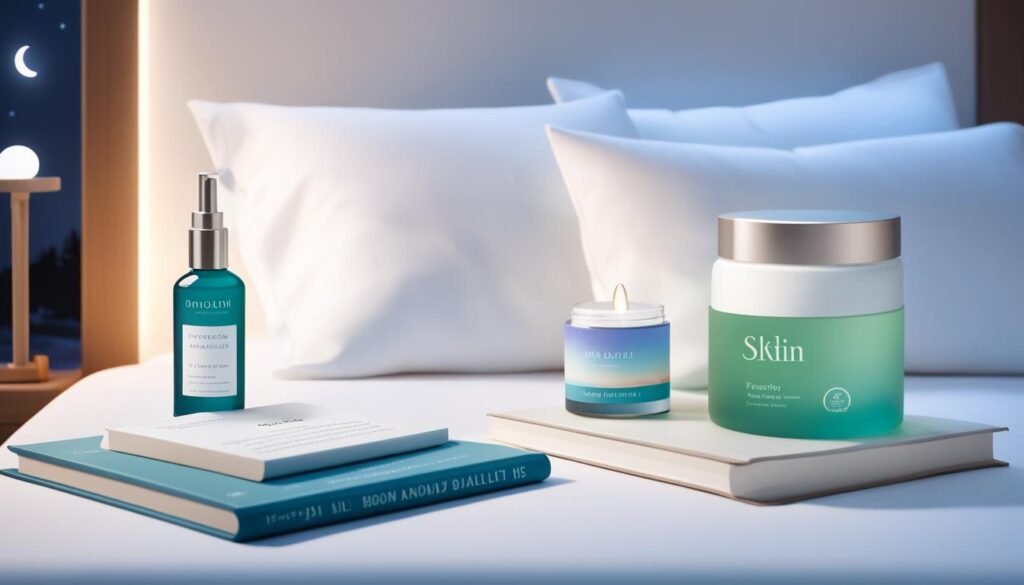
Sleep plays a crucial role in our overall skin health, and it should be integrated into our skincare routine. While we sleep, our skin undergoes essential repair and regeneration processes that contribute to its overall health and appearance. By aligning our sleep with our skincare routine, we can optimize the benefits of both for healthier and more radiant skin.
During sleep, our skin’s natural healing and renewal processes are at their peak. This makes it an ideal time to introduce certain skincare products into our routine that can enhance these processes. Overnight masks and serums, specifically formulated to be used while we sleep, can provide deep hydration, boost collagen production, and promote skin rejuvenation.
In addition to incorporating sleep-enhancing skincare products, practicing good sleep hygiene can also improve our skin health. One way to achieve this is by using silk bed linens. Silk is known for its gentle and smooth texture, reducing friction and minimizing the risk of skin irritation. It also absorbs less moisture and dirt, helping to maintain the cleanliness of our skin and prevent breakouts.
Maintaining a consistent sleep schedule is another important aspect of integrating sleep and skincare. Our skin responds well to routine, and a regular sleep pattern can help regulate skin functions and reduce inflammation. By prioritizing a consistent sleep schedule, we are providing the necessary time and conditions for our skin to repair, regenerate, and rejuvenate.
The Benefits of Integrating Sleep and Skincare
Integrating sleep and skincare can yield numerous benefits for our skin health:
- Promotes skin repair and regeneration: Applying overnight masks and serums during sleep enhances the skin’s natural healing processes, leading to improved skin texture and tone.
- Boosts hydration: Overnight skincare products can deeply hydrate the skin, preventing moisture loss and improving overall skin hydration.
- Reduces signs of aging: By optimizing the skin’s repair and regeneration processes, integrating sleep and skincare can help reduce the appearance of fine lines, wrinkles, and dullness.
- Minimizes skin irritation: Using silk bed linens and practicing good sleep hygiene can reduce friction and irritation on the skin, minimizing redness and inflammation.
- Enhances overall skin health: By incorporating sleep into our skincare routine, we are prioritizing the holistic approach to skin health, addressing both external and internal factors that contribute to skin well-being.
Integrating sleep and skincare is a proactive approach to maintaining optimal skin health. By harnessing the power of sleep and combining it with skincare products and practices, we can achieve healthier, more radiant skin.
By integrating sleep and skincare, we can optimize the benefits of both for healthier and more radiant skin.
Conclusion
Adequate sleep is crucial for maintaining optimal skin hydration and overall skin health. Research has consistently shown that sleep deprivation has negative effects on the skin, such as dryness, decreased elasticity, and the exacerbation of skin conditions. On the other hand, getting enough sleep plays a vital role in maintaining the skin’s moisture balance, promoting skin repair and regeneration, and preventing premature aging.
It is important to prioritize sleep and practice good sleep habits for the sake of our skin health. By ensuring we get enough restful sleep, we can enhance the health and appearance of our skin. Moreover, the benefits of sleep extend beyond just our skin. Adequate sleep is essential for overall physical and mental well-being, with sleep deprivation being linked to various health issues such as diabetes, heart disease, and impaired cognitive function.
Integrating sleep into our skincare routine is also crucial. By taking advantage of the skin’s repair and regeneration processes during sleep, we can optimize the benefits of products such as overnight masks and serums. Additionally, using silk bed linens can reduce friction and inflammation, while maintaining a consistent sleep schedule and practicing good sleep hygiene contribute to improved sleep quality and, consequently, healthier skin.
FAQ
What is the role of sleep in skin hydration?
Sleep plays a crucial role in maintaining skin hydration. Adequate sleep helps to maintain the skin’s moisture balance and promote a healthier complexion.
How does sleep influence skin hydration level?
Sleep has a direct impact on the water content of the skin. Insufficient sleep can lead to dehydration, resulting in dry, flaky, and dull-looking skin.
What is the relationship between sleep and skin hydration?
Research has shown that people who get less sleep tend to have lower skin hydration levels compared to those who get enough sleep. Good sleep helps to keep the skin hydrated, balanced, and healthy.
What are the effects of sleep deprivation on skin appearance?
Lack of sleep can cause dark under-eye circles, dry skin, and the hollowing of the cheeks. It has also been linked to decreased skin elasticity, contributing to fine lines and wrinkles.
How can I improve my skin during sleep?
Using silk sheets and pillowcases can reduce inflammation and friction, benefiting those with acne or sensitive skin. Silk also absorbs less moisture and dirt, promoting healthier skin.
What is the connection between sleep and skin function?
During sleep, the body undergoes restorative processes, including the production of growth hormones and the repair of damaged skin cells. Adequate sleep allows for effective skin repair and renewal.
How does sleep quality affect skin moisture?
Poor sleep quality can lead to decreased skin hydration, resulting in dry and dull-looking skin. Sleep disturbances have been associated with an increased risk of skin dehydration and barrier dysfunction.
Can sleep deprivation worsen skin conditions?
Yes, inadequate sleep can increase the severity of skin conditions such as acne, eczema, psoriasis, and rosacea. Sleep disruption can also lead to increased inflammation in the skin.
What is the impact of sleep on skin aging?
Lack of sleep can contribute to the development of wrinkles, fine lines, and a dull complexion. Sleep deprivation decreases collagen production and impairs the skin’s ability to repair itself.
How does sleep affect overall well-being?
Inadequate sleep can increase the risk of type II diabetes, heart disease, mental health challenges, and affect mood, cognitive function, and immune system function.
How does sleep connect with a skin care routine?
Sleep is an ideal time to apply products that can enhance skin repair and regeneration. Good sleep habits, silk bed linens, and a consistent sleep schedule can also contribute to improved skin health.
What is the summary of the role of sleep in skin hydration?
Adequate sleep is essential for maintaining optimal skin hydration. It helps to maintain the skin’s moisture balance, repair and regenerate skin cells, and prevent premature aging. Prioritizing sleep is crucial for overall skin health and well-being.

